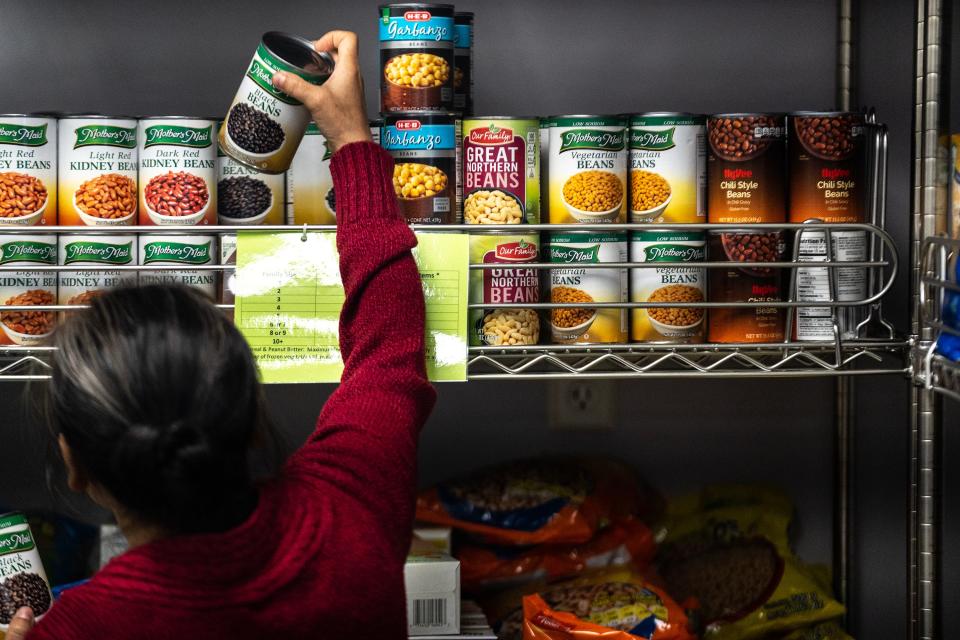Government reorganization, school book bans: 10 new Iowa laws taking effect July 1
A massive reorganization of Iowa’s government, a ban on school books that depict sex acts and new limits on the state auditor are among the biggest changes as a slew of new Iowa laws are now in effect.
Republicans expanded their majorities in the Iowa Legislature last fall and set to work enacting sweeping changes to Iowa’s laws in 2023. Many of those took effect July 1, at the start of the state’s new fiscal year.
They include significant changes to Iowa’s education system, a reshuffling of employees and power in the state’s executive branch and new requirements for receiving public benefits such as food assistance.
Here are some of the major laws now in play.
State government reorganization to reshape Iowa agencies
One of the biggest changes taking effect: the reorganization of the state’s entire executive branch.
As of July 1, Gov. Kim Reynolds’ massive 1,500-page government restructuring effort is official, shrinking the number of cabinet-level executive branch agencies in Iowa from 37 to 16.
That means thousands of state employees are now working in new departments, some with new job responsibilities and a new reporting structure and chain of command.
More: Gov. Kim Reynolds signs law reshaping Iowa government, reducing agencies. What it does:
Kraig Paulsen, director of the Iowa Department of Management, said he believes the transition is “going extremely well.”
“What I think Iowans should expect is really there should be no interruption in service,” he said June 26. “That’s been the goal from the beginning. I think it should be extremely seamless for Iowans.”
Paulsen said the state has done a complete inventory of its IT, human resources and payroll systems, and every department was ready to transition to the new organizational structure July 1.
The only thing that isn't done, he said, is signage.
Prohibition on school books with sex acts
When Iowa kids return to school in the fall, they likely will notice several changes as a result of one of this year’s biggest education laws.
Schools must remove books with “sex acts,” defined by Iowa law as a specific set of sexual actions. That means some controversial books, such as the graphic memoir “Gender Queer,” may disappear from the shelves.
Education leaders in Iowa warned the law will force the removal of well-known novels that include descriptions of sex.

Although the law went into effect July 1, the book restrictions aren't enforceable until January. After that, teachers or school superintendents will face discipline from the Board of Educational Examiners if they provide books that include sexually explicit images or descriptions.
The same law, Senate File 496, prohibits instruction on gender identity or sexual orientation in kindergarten through sixth grade. Parents must consent for a child to use new pronouns in school.
More: Kim Reynolds signs sweeping Iowa education law on book bans, LGBTQ teaching. What it does:
Other LGBTQ-related laws to prohibit gender-affirming care for transgender kids and restrict school bathroom use based on birth sex went into effect when they were signed into law in March.
New requirements begin for public assistance programs
Some new laws will take more time to implement, including changes to Iowa’s public assistance programs suCH AS Medicaid and the Supplemental Nutrition Assistance Program, or SNAP.
Reynolds signed a law in June requiring regular eligibility checks for Iowans receiving public assistance, requiring Medicaid recipients to cooperate with child support services and creating a new asset test for Iowans receiving money from SNAP.
But the new requirements aren’t in place yet. The law says the requirements must be fully implemented by July 1, 2025.
More: Iowans face new tests, checks to get food, health care assistance. Here's how new law works:
Alex Carfrae, a spokesperson for the Iowa Department of Health and Human Services, said the department has begun IT system updates “to ensure we meet legislative implementation deadlines.”
“Because of these required steps, Iowans who rely on SNAP or Medicaid won’t see any immediate changes to their eligibility,” Carfrae said in an email. “As with any changes to our assistance programs, we will communicate well in advance with recipients to prepare them for any impact the changes may have on their families.”
When the requirements do take effect, a nonpartisan state agency estimates thousands of Iowans will lose benefits because of discrepancies. Supporters argue the law will save taxpayer dollars and ensure benefits are going to those who need them.

Expanding jobs, hours that teens can work in Iowa
Iowans may see 14- and 15-year-olds working at restaurants, gas stations and movie theaters until 11 p.m. this summer — two hours later than they were previously allowed to be on the job.
That’s because of an overhaul of Iowa’s child labor laws that allows teenagers to work more hours and in jobs that were previously prohibited.
Teens under 16 can work up to six hours on a school day, two more than under Iowa’s previous law. They can work until 11 p.m. during the summer and until 9 p.m. during the school year. Teenagers 16 and older can work the same number of hours as adults.
More: Gov. Kim Reynolds loosens Iowa child labor laws to let teens work more hours. What to know:
Sixteen- and 17-year-olds can also work in more jobs, such as woodworking, operating power saws and demolition, as long as they are part of an approved training program with supervision and safety precautions.
And teens as young as 16 can serve alcohol at restaurants with a parent’s written permission.
Limiting the state auditor’s access to information, courts
The Iowa State Auditor’s office faces new restrictions on its ability to access certain types of personal information and can no longer take state agencies to court to force them to turn over documents.
Reynolds signed the law in June. She and other Republicans have said the limits on the auditor are necessary to protect Iowans’ private information.
Sand, the only Democrat elected to statewide office in Iowa, has called it the “most pro-corruption” law in Iowa history.

The law blocks the state auditor's office from suing another statewide officeholder or executive branch agency, department, board or commission to enforce a subpoena for documents.
Instead, disputes will be settled by a three-member arbitration panel, with one person appointed by the auditor, one by the agency being audited and one by the governor. The panel’s decision will be final.
More: Gov. Kim Reynolds signs law restricting Iowa State Auditor Rob Sand's powers. Here's how:
The law also prohibits the auditor from accessing personal information, including medical and counselor records, students' educational records, peace officers' reports and attorney work product.
It contains exceptions allowing the auditor to obtain that information if required to comply with generally accepted government auditing standards, or in cases of alleged or suspected embezzlement or theft.
Steeper penalties for fentanyl crimes
Iowans now face higher sentences for manufacturing, delivering or possessing fentanyl.
The law also boosts penalties for offenses related to other drugs, not just fentanyl, if someone is killed or injured, or if a minor is involved.
The law was a high priority for Reynolds and Attorney General Brenna Bird. When she signed the bill in May, Reynolds said fentanyl “is fueling addiction, death and chaos.”
More families eligible for child care assistance
More Iowa families now qualify for child care assistance payments from the state, but they’ll have to work more hours per week to stay in the program.
House File 707 increases the income limit for child care assistance to 160% of the federal poverty level. That's a limit of $39,776 for a family of three, or $48,000 for a family of four.
A child’s parent or guardian must be employed or attending school or vocational training for an average of 32 hours a week, four hours more than the previous law required.
Families of kids with special needs have more lenient work requirements and a higher income threshold.
More: Kim Reynolds signs law expanding Iowa child care assistance. Here's how it works:
Parents added to the teacher licensing board
New members will be added to Iowa’s Board of Educational Examiners, the state body that oversees teacher licensing.
House File 430 requires that the board include four individuals who "have demonstrated an interest in education but have never held a practitioner's license."
Two will be parents of a student who is currently enrolled in public, private or charter school, and one must be a current or former school board member.
New school librarian standards, other school changes
Schools may now hire former public librarians to work as a teacher-librarian. School librarians are no longer required to have a master’s degree to be licensed by the state.
Senate File 391 makes several more changes to the nuts and bolts of Iowa’s education system. Schools are excused from doing a “comprehensive school improvement plan” for the state, and high schools are required to offer fewer fine arts and world language classes.
In-person caucus requirement takes effect
A new law now requires Iowans participating in the state’s first-in-the-nation caucuses to be physically present.
The new Iowa law says if an Iowa political party “chooses to select its delegates as part of the presidential nominating process at political party precinct caucuses” and goes first, then the caucuses need to be held in person.

That has implications for Iowa Democrats’ plans to hold a mail-in caucus to determine Iowans’ 2024 presidential preferences.
More: Kim Reynolds signs law requiring in-person Iowa caucuses, escalating fight with Democrats
Democrats say they’re committed to offering a more inclusive process that allows greater participation, but Republicans say the plan amounts to a primary and will cause New Hampshire to move its contest ahead of Iowa.
The law also changes the method for choosing candidates for state representative and state senator in the event of a tie during a primary election. Previously, the winner was chosen by drawing a name out of a hat. Now, the political party’s committee members from within that district will choose the candidate.
Stephen Gruber-Miller covers the Iowa Statehouse and politics for the Register. He can be reached by email at sgrubermil@registermedia.com or by phone at 515-284-8169. Follow him on Twitter at @sgrubermiller.
Katie Akin is a politics reporter for the Register. Reach her atkakin@registermedia.com. Follow her on Twitter at @katie_akin.
This article originally appeared on Des Moines Register: Banned books, child labor: What new Iowa laws take effect July 1?

